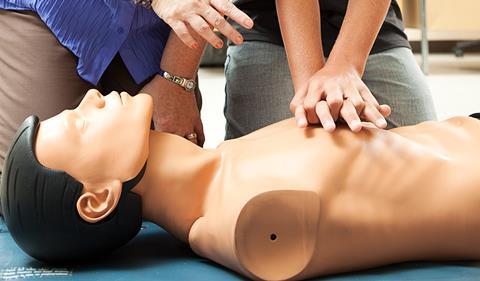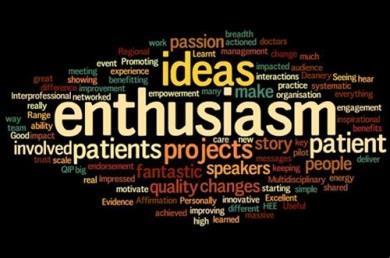An alternative approach to training can teach doctors how to improve services, not just implement them. By Tricia Woodhead, Emma Vaux and Ed Donald

Knowledge that human factors are a risk and that delivering very high levels of reliability when systems are complex is difficult is all too obvious to the staff working in hospitals
The King’s Fund’s Time to Think Differently programme explores the challenges of matching the health and social care workforce to the work required in times of significant change. This problem sits alongside the increasing need to reduce avoidable harm within our healthcare systems. At the same time, through new medical science and delivery models, we have seen the system of care provision become more complex.
That human factors are a risk and that delivering very high levels of reliability when systems are complex or difficult is all too obvious to the staff working in hospitals. Yet professional training has traditionally, and not unreasonably, focused on the specific clinical skills and knowledge of medicine, nursing pharmacy, physiotherapy and radiography rather than knowledge of how to work on the system in which it is practiced.
Adapting traditional education to rapidly shifting needs and expectations is not an easy task at a time when the medical science has an ever shortening half-life, which puts pressure on any curriculum
Beyond audits
To meet the significant challenge of realigning our service design to demographic needs, as well as to improve the standards and reliability of service delivery, requires a new sort of “in service training”.
The pace of change is such that clinical skills and how to deliver them need to be developed in tandem. We need to develop this capability at scale and in the workplace.
‘If there is a missing ingredient currently it is that many senior doctors are new to the idea of improvement as a methodology’
The Royal College of Physicians, local and regional safety improvement collaborative programmes and some deaneries are now expanding the opportunity for qualified doctors in training posts to gain practical experience of “the science of improvement”.
Foundation doctors, core medical trainees and specialist trainees in anaesthesia are now all being supported to undertake projects in improvement and not simply clinical audits.
The skills they develop are thoughtful review of the situation; team work to understand the system within which the care is being provided; concepts of flow, variation and measurement to secure understanding of how to achieve higher levels of reliability; and how to sustain those improvements over time.
In the past we have sought to deliver improvement via the circulation of best practice, professional standards, provision of leadership training, development of the clinical audit programme and the peer-pressure of the clinical governance meeting.
However, a better way is practical support and the use of a single and well designed methodology that can easily be added to any clinical audit programme.
Fusion of aims
A clear simple method, called “the model for improvement”, can improve the many areas that doctors in training themselves find frustrating and in need of “redesign” such as unreliable handover, agreeing and ensuring appropriate escalation, the reliable implementation of sepsis, safety check lists for ward interventions and others (see first box, below).
Where such projects involve the multidisciplinary team and/or patients, the learning and experience may be enhanced significantly (see second box).
In addition, the sense of enthusiasm when projects are presented to peers and senior medical and management colleagues gives us optimism for the future of high quality healthcare.

Health Education England’s Making Every Moment Count pilot at Royal Berkshire
This pilot enabled doctors in training of all specialties and grades to learn by doing quality improvement as part of the multidisciplinary team, while also identifying the infrastructure and developing the resources needed to support such an approach. This included:
- Development of a pre-operative assessment DVD by a specialty registrar 5 anaesthetic trainee to address patient concerns and fears regarding anaesthesia, thereby making having an operation a less stressful experience. The outcome was patient anxiety levels reduced as a result.
- A multidisciplinary collaboration by level 1 and 2 core medical trainees to enable timely insertion of long term ascitic drains in patients with metastatic cancer. This changed the lives of 12 patients.
- Streamlining care for children with cystic fibrosis admitted electively for antibiotic treatment with development of an integrated care pathway by a specialty registrar 5 paediatric trainee. This led to happier children, parents and staff.
It has been a challenge to promote ideas and enthusiasm for change and improvement in many parts of the NHS in recent years. What we have learnt is that young professionals, though still honing their clinical decision making skills, can rapidly develop capability in the science of improvement.
To harness this capability in medical, nursing, allied health professionals and management trainees would be a new and passionate resource to build more resilience in the NHS. The challenge is to develop local adaptation and support to better engage the local workforce. Our experience is that a well supported local programme of coaching and facilitating quality improvement projects achieves exactly this.
When the senior and upper management of a hospital sit down and listen to doctors in training present their work there is a fusing of aims and objectives and a new sense of common purpose. The relentless focus becomes one of shared purpose and energy rather than pace setting and pressure. A problem shared is a problem on the way to being solved.
Patient involvement in quality improvement in practice at Royal Berkshire
“I was diagnosed in December 2012 with breast cancer. A plan was put before me that meant spending a lot of time in hospital. The care and process was always there from day one, but my anaesthetist recognised she could make the moments she was with me count and it made all the difference.
“I was asked to be part of making a DVD to help reassure patients about their anaesthetic as she could see from first-hand experience that I was a bit of a nervous wreck. I was more than happy to be part of the film, with one condition: I didn’t have to watch it.
“I did watch it though and the DVD produced as part of Making Every Moment Count will make an enormous difference to patients on the run-up to their surgery, it will ease fears before surgery and calm nerves on the day. Being part of the DVD was such a rewarding experience, so thank you very much and I am glad to say that I don’t mind hospitals that much now.”
Improvement champions
If there is a missing ingredient currently it is that many senior doctors are new to the idea of improvement as a methodology and are hesitant to engage. We feel that some realigning of college based senior medical training towards the swift development of improvement skills would add further momentum to the pace of planning for and delivering safer and better care for patients. Improving their practice is not a foreign concept to consultants but there is a need to grasp that their own practice is not the only source of the excellence they seek in a complex system.
The rationale behind the strategy of recruiting outside consultants is often to unpick tradition and barriers, and secure savings as a result of consultancy effort and fees. This puts the challenge to us as leaders to promote improvement work as part of every training curriculum.
The balancing of cost, patient experience and quality of care and outcome is everyone’s work every day. In his patient safety review, Don Berwick urges us to “foster wholeheartedly the growth and development of all staff, especially with regard to their ability and opportunity to improve the processes within which they work” and “incorporate [it] as part of our daily work”.
The embedding of improvement methodology as a core competence in all doctors should be our contribution to building a more capable and resilient workforce and financial stability. Medical and non-medical executive leadership should promote and champion this work.
Tricia Woodhead is a consultant radiologist and medical lead for Safer Care South West, Emma Vaux is a consultant nephrologist and associate medical director of the Joint Royal Colleges of Physicians Training Board, and Ed Donald was chief executive of Royal Berkshire Foundation Trust



























No comments yet